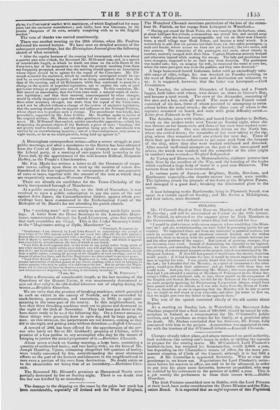The "working men" will act wisely in avoiding torch-light meetings.
A letter from the Home Secretary to the Lancashire Magistrates, communicated through the Lord-Lieutenant, gives fair warning that such assemblies are illegal. This is the Under Secretary's letter to the "Magistrates acting at Hyde, Manchester "— "Whitehall, November 22. "Gentlemen—I am directed by Lord John Russell to acknowledge tire receipt of your letter of the 16th instant, (which did not reach this office till the 20th instant,) stating the circumstances connected with a meeting of an illegal character. which is as held at Hyde by torch-light, on the evening of the 14th instant, and which it appears was convened by advertisement, the date of which is not stated.
" Lord John Russell requests that, in the event of any public notice being given of any other meeting at night within your district, you will send him immediate infinmation of it ; and he thinks it will be advisable in such case, that the Magistrates should issue a public notice, warning all persons of the illegality of such meetings, and of the danger of attending them, and that t lie Magistrates are determined to preserve peace. "Lord John Russell also requests the Magistrates to take measures for obtaining correct information of all that passes at any future meeting, with a view to bringing to justice persons who may be guilty of a violation tithe law. But he advises the M ag is. trates not to attempt by force to disperse a meeting, unless the peace is actually broken, and iuterterence fur dispersing the meeting is absolutely necessary." " I am, &c. S. M. Pirri.mes."
After a discussion of considerable length, at the last meeting of the Guardians of the Havant Union, it was unanimously determined to give out-door relief to the able-bodied labourers out of employ during the win ter. —Brighton Guardian.
We are sorry that the practice of breaking machines, which prevailed to such an extent in the county of Norfolk, and was succeeded by stack-burning, prosecutions, and executions, in 1832, is again commencing in the same part of the county. In this neighbourhood, no less than three thrashing-machines were cut to pieces and destroyed in the night of the 26th of November. They had been put down at the barn-doors ready to be used the following day. On a former occasion, these things were generally done in open day, and by large gangs of men on this occasion, the perpetrators are not known, coming as they did in the night, and getting away without detection.—Suffolk Chronicle.
A reward of 500/. has been offered for the apprehension of the person who lately set fire to Mr. Goddard's property at Chilton, with a promise of a free pardon to any accomplice who may be the means of bringing to justice the actual perpetrator of it. —Berkshire Chronicle.
About seven o'clock on Sunday morning, a large barn, containing a quantity of unthrashed barley, and two barley-ricks, on the farm of Mr. Joseph Humfrey, Upton, containing altogether 160 quarters of barley, were totally consumed by fire, notwithstanding the most strenuous efforts on the part of the farmers and labourers in the neighbourhood to save even a portion of the corn from destruction. No doubt exists as to the abominable act being that of an incendiary.—Berhshire Chroaide.
The Reverend Mr. Blissard's premises at Hampstead Norris were partially destroyed by fire on Sunday night. Them is no doubt that the fire was kindled by an incendiary.


























 Previous page
Previous page